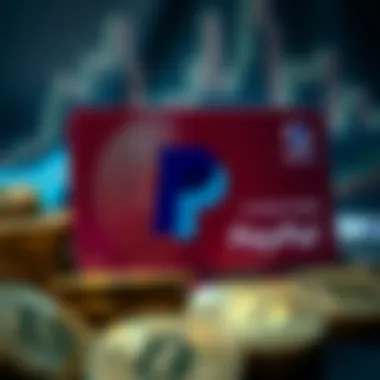A Comprehensive Guide to Buying Cryptocurrency with PayPal


Intro
In recent years, the world of finance has undergone a massive transformation, largely due to the emergence of cryptocurrencies. These digital currencies have captured the attention of investors and everyday users alike, prompting many to consider how they can engage with this innovative market. One method gaining traction is purchasing cryptocurrency through PayPal, a platform known for its convenience and widespread use. This guide will navigate through the steps and considerations necessary to successfully buy cryptocurrency using PayPal.
Understanding the nuances of this process is key. PayPal offers a user-friendly interface, making it accessible even to those who may not be overly tech-savvy. However, like any financial transaction, it’s crucial to grasp the associated risks, potential fees, and security measures before diving in. As cryptocurrencies offer a level of volatility not commonly seen in traditional investments, comprehending market dynamics and developing sound investment strategies is essential.
In the sections that follow, we will explore various market trends, investment strategies, and the technicalities of using PayPal for cryptocurrency transactions. Each of these facets contributes to creating a holistic understanding of how to navigate this complex and often unpredictable landscape of digital currency buying.
Understanding Cryptocurrency and Its Importance
Cryptocurrency has shifted from being a niche digital curiosity into a cornerstone of modern finance. The rise of this digital asset class has drawn the interest of traders, investors, and even traditional financial institutions. Understanding cryptocurrency is not just a matter of distinguishing it from fiat currency; it's about grasping the fundamental changes it brings to transactions, investment avenues, and economic interaction on a global scale.
One of the central features of cryptocurrencies is their decentralized nature, meaning they operate without a central authority, like a bank or government. This aspect has major implications for how individuals manage their wealth and interact with the global economy. Moreover, cryptocurrencies often boast lower transaction fees compared to traditional banking methods, making them an appealing option for many.
When delving into why people turn to cryptocurrency investing, the reasons are varied and compelling. From speculation and potential for high returns to the appeal of technology and the philosophy of decentralization, cryptocurrencies offer a unique blend of financial opportunity. Understanding how these digital assets work can help investors make informed decisions, whether they're seasoned traders or newcomers.
Furthermore, the variety of cryptocurrencies available today adds another layer to the importance of understanding this realm. Each digital coin has its own set of features and use cases. Hence, familiarizing oneself with the prominent options, such as Bitcoin, Ethereum, and Litecoin, equips potential investors with the knowledge needed to navigate the complexities of the market.
In this context, a cryptocurrency isn't merely an investment tool; it's a gateway to a paradigm shift in finance and technology. The ramifications of this shift could redefine not only investments but how we think about money and trust in the digital age.
Preamble to PayPal as a Payment Method
In today’s digital age, the ability to buy cryptocurrency is not solely about understanding the tech behind blockchain; it's also about knowing how to navigate the financial tools available for such transactions. PayPal serves a critical role in this ecosystem, providing a user-friendly platform that simplifies the buying process. Not only does it afford buyers a sense of security, but it also opens the door for a larger audience, including those who may not be well-versed in crypto jargon.
When discussing cryptocurrency purchases, we must look at the distinct advantages PayPal brings to the table. Its user base is vast—over 400 million active accounts as of late 2023—indicating that many people are ready to jump into the crypto waters. Convenience can’t be overlooked; PayPal's digital wallet allows users to link multiple bank accounts and cards, making transactions quicker than trying to remember lengthy wallet addresses or dealing with the intricacies of traditional banking.
Yet, while the benefits are compelling, it’s crucial to also keep an eye on the considerations that come with using PayPal for cryptocurrency. Users may face certain limitations, such as the types of cryptocurrencies available for purchase and the potential transaction fees that can sneak up on the unaware. This section aims to illuminate how PayPal has evolved to meet consumer needs in the cryptocurrency space and the features that solidify its spot as a preferred payment method.
PayPal's Evolution in the Financial Sector
PayPal began its journey back in 1998, initially focusing on digital payments. Since then, it has transformed dramatically, continuously adapting to consumer needs and technological advancements. The company has systematically expanded its service offerings, showing agility that keeps it ahead in a competitive financial market.
Recently, with the rise of cryptocurrencies, PayPal took a pivotal step by integrating crypto-buying capabilities. This isn’t simply a superficial add-on; it's a strategic pivot that aligns with the evolving landscape of finance. By allowing users to buy, sell, and hold various cryptocurrencies directly within the platform, PayPal has effectively acknowledged the changing preferences of modern consumers, who increasingly seek to engage with digital assets.
This evolution is significant because it bridges traditional financial systems with the new wave of decentralized assets. Users who may have hesitated to engage with cryptocurrency now have a familiar interface to interact with this exciting new realm.
How PayPal Works for Consumers and Merchants
From a consumer perspective, PayPal is synonymous with convenience and simplicity. Users can create an account in a matter of minutes, connecting it to their bank accounts or credit cards. Once set up, buying cryptocurrency is as straightforward as making any other purchase on the platform. This ease is a considerable draw for both novice and seasoned investors looking to diversify their assets.
Merchants also find PayPal's structure beneficial. By tapping into the existing, robust infrastructure of PayPal, they can offer cryptocurrency as a payment option without the heavy lifting usually associated with setting this up. For those looking to sell goods and accept crypto payments, this could mean an expanded market reach. However, merchants must exercise caution due to some risks, like price volatility and regulatory complications.
Features of PayPal That Support Cryptocurrency Transactions
Several features make PayPal an attractive choice for handling cryptocurrency transactions. Here are a few standout elements:
- Instant Transactions: Once you make a purchase, the cryptocurrency is usually accessible immediately, unlike some traditional exchanges that may require a waiting period.
- User-Friendly Interface: A clean, easy-to-navigate layout means both new and experienced users can familiarize themselves quickly with the buying process.
- In-App Wallet: PayPal allows you to store your cryptocurrencies within the platform, avoiding the need for external wallets which can be cumbersome to manage, especially for newcomers.
- Security Measures: PayPal offers buyer protection and end-to-end encryption, adding layers of safety to transactions that not all platforms can guarantee.
Steps to Buy Cryptocurrency Using PayPal
Navigating the realm of cryptocurrency can be daunting, especially when you're utilizing a platform like PayPal. Knowing how to effectively buy cryptocurrency using this payment method can empower traders and investors, making investments more accessible. The following sections break down the essential steps, offering clarity on each aspect of the process—everything from account set-up to making that first purchase and beyond.


Setting Up a PayPal Account
If you don’t have a PayPal account yet, it’s time to roll up your sleeves and get one. The process is straightforward, requiring your email and some personal information. You’ll want to make sure that you provide accurate details since verification may be a necessity. If you've ever signed up for an online service, you’ve basically got the hang of this.
- Go to the PayPal website or download the app.
- Click on "Sign Up."
- Choose between a personal or business account—most users go for personal.
- Fill out the required forms and link a bank account or credit card on your profile for easier transactions.
Once your account is set up, you’re on the way to making your first cryptocurrency investment.
Linking Your Bank Account or Credit Card
Linking your bank account or credit card to your PayPal account is crucial for buying cryptocurrency. This step allows you to fund your transactions without delays. Here’s how.
- Navigate to your PayPal account’s settings.
- Select 'Banks and Cards.'
- Follow the guided steps to add a card or bank account.
It’s worth noting that using a credit card may come with its own fees and charges, so it pays to read the fine print.
Choosing a Cryptocurrency Exchange
The exchange you choose is the gateway to your cryptocurrency purchases. Each platform has its unique features, fees, and available currencies.
Coinbase
Coinbase caters to newcomers and seasoned traders alike, making it a popular choice. Its user-friendly interface makes buying, selling, and storing crypto an absolute breeze. Notably, Coinbase allows you to utilize your PayPal account to fund purchases as well.
- Key Characteristic: High level of security & easy-to-navigate platform.
- Unique Feature: User-friendly educational resources for beginners.
- Advantages: Wide range of cryptocurrencies and simple transaction processes.
- Disadvantages: Higher fees when compared to other exchanges—so be careful with small transactions.
Binance
Binance, known for its extensive variety of trading pairs, offers an impressive platform for cryptocurrency enthusiasts. While it does not directly support PayPal, there are ways to use PayPal by first buying Bitcoin and transferring it over.
- Key Characteristic: Low trading fees and advanced charting tools.
- Unique Feature: Binance Smart Coin projects.
- Advantages: Allows advanced trading strategies for experienced users.
- Disadvantages: Complicated for less experienced users; you'll need to do more research.
eToro
Known less for being a traditional exchange, eToro is more of a social trading platform where you can see what others are trading and follow their strategies. You can buy and sell crypto using PayPal funds, making it quite convenient.
- Key Characteristic: Innovative copy trading feature.
- Unique Feature: Ability to follow and mimic successful traders in real-time.
- Advantages: Great for those who are inexperienced yet eager to learn from top performers.
- Disadvantages: Limited number of available cryptocurrencies.
Making Your First Purchase
After completing the above steps, you're finally ready to make that leap into buying cryptocurrency. Select your chosen exchange, log in with your newly set account, and finalize your investment.
- Select the Cryptocurrency: Choose the digital asset you want to buy.
- Enter Purchase Amount: Specify how much you wish to invest.
- Confirm Payment Method: Opt for PayPal as your payment choice.
- Review and Confirm: Always double-check transaction fees before confirming.
By understanding these steps, you're not just gearing up to make your first purchase; you are equipping yourself for future transactions as well. As with any investment, tread carefully, stay informed, and keep your options open.
Considerations Before Buying Cryptocurrency
Before diving into the thrilling world of cryptocurrency, it’s crucial to navigate through some considerations that could mean the difference between making a fortune and experiencing a disheartening loss. This section sheds light on key elements that every potential investor should grasp before making that first purchase. Not only does this awareness empower informed decisions, but it also helps in mitigating risks that come with digital assets.
Understanding Fees and Charges
Dollars and cents often dictate how much we can afford to invest. When buying cryptocurrency, various fees come into play. Transaction fees can vary notably across platforms; some may charge flat fees while others rely on a percentage of the transaction volume. Take Coinbase, for instance, which has a clear fee structure that changes with the transaction amount, whereas services like Binance often have lower fees but more complexity involved.


If you’re using PayPal to buy cryptocurrency, you might also encounter additional charges, such as currency conversion fees and withdrawal fees. It’s not just about the buying price — keeping an eye on these add-ons can save you a bundle. To lay it out:
- PayPal might charge a fee for buying crypto.
- Exchange fees add another layer of expense.
- Make sure to read all fee disclosures before confirming transactions.
"Act smart and know your costs; ignorance can lead to costly surprises!"
Security Considerations
The excitement of trading cryptocurrencies shouldn’t drown out the need for vigilance regarding security. Cyber threats lurk around every digital corner, and ensuring the safety of your investments should be on top of your list. Two-factor authentication (2FA) is a great place to start. Enable 2FA wherever possible; it’s like adding another lock to your door.
With PayPal offers a certain comfort level since it function as a protective barrier. However, not all cryptocurrency exchanges have the same stringent security measures as PayPal. Thus, evaluating exchange security protocols is a must. Ask yourself questions like:
- Does the exchange have a good reputation for security?
- Are funds stored in cold wallets or hot wallets?
- What are the protocols in place for dealing with breaches or losses?
Keeping these factors in mind will help you make smarter investments and maintain peace of mind.
Investment Risks in Cryptocurrency
Cryptocurrency is not just a ride in a Ferrari; it can also feel like a rollercoaster ride at times. The market is highly volatile, which translates to risk. Prices can soar or plummet with the drop of a hat. While tales of individuals hitting it big abound, it’s important to balance your enthusiasm with caution. Here are some risks to consider:
- Market Volatility: Sudden price drops can lead to significant losses.
- Regulatory Risks: Governments can introduce laws that impact cryptocurrency usability in your region.
- Scams and Frauds: The anonymity of transactions also attracts ill-intentioned actors. Stay alert.
To counteract these risks, it wouldn’t hurt to diversify your portfolio. Putting all your eggs in one basket can be a recipe for disaster. Exploring different sectors of the market allows for some safety net while you navigate through this complex landscape.
In summary, comprehending the multi-faceted considerations of fees, security, and investment risks equips you with a sharper mindset as you venture into purchasing cryptocurrency. A thorough approach will grant you the clarity need to forge ahead with confidence.
Storage Options for Cryptocurrencies
When delving into the world of cryptocurrency, having a clear understanding of storage options is vital. This section explores the ways you can safeguard your digital assets, which is just as crucial as buying them. With various options available, investors need to assess which type of storage aligns with their security needs, ease of use, and accessibility requirements. Choosing the right method can make a significant difference in how safe your investments are over the long haul.
Hot Wallets vs. Cold Wallets
At the very heart of cryptocurrency storage lies the distinction between hot wallets and cold wallets. Hot wallets are connected to the internet and offer convenient access to your funds, making them an attractive choice for active traders. However, this connectivity makes them more vulnerable to hacks and cyberattacks.
In contrast, cold wallets, which can be either hardware devices or paper wallets, are not connected to the internet. They provide a higher layer of security as they keep your private keys offline, far away from prying eyes and malicious entities. Here is a more detailed comparison:
- Hot Wallets
- Cold Wallets
- Pros:
- Cons:
- User-friendly interface
- Instant access to funds
- Ideal for frequent trading
- Vulnerable to online threats
- Less secure for long-term storage
- Pros:
- Cons:
- Higher security due to offline storage
- Best for long-term investments
- Less convenient for quick transactions
- Can be lost or damaged
"The right storage choice is one that matches both your trading habits and your risk tolerance."


Choosing the Right Wallet for Your Needs
Selecting the right wallet isn’t a one-size-fits-all kind of deal. Factors such as your investment strategy, how often you trade, and your overall comfort level with technology play important roles. Here’s a breakdown to consider:
- Assess Your Trading Frequency
If you’re active in trading, a hot wallet might be more your style as it provides easy access to your funds. But if you’re more of the buy-and-hold type, a cold wallet offers peace of mind. - Security Features
Look for wallets that provide robust encryption and additional security measures like two-factor authentication. It’s better to be safe than sorry. - User Experience
Evaluate the wallet's interface. A complicated design might not be ideal for someone new to cryptocurrencies. - Compatibility
Ensure that your chosen wallet can handle the specific cryptocurrencies you plan to store. Some wallets are only designed for particular coins. - Backup Options
Always consider whether the wallet provides clear backup procedures. A good wallet should ensure that you can recover your funds even if you lose your access credentials.
In summary, choosing a cryptocurrency wallet demands careful consideration and an understanding of your personal circumstances. With the right choice, you can securely store your assets and focus on investment strategies rather than worries about losing your funds.
Regulatory Aspects of Buying Cryptocurrency
The realm of cryptocurrency is riddled with complexities, and one paramount aspect that investors must grasp is the regulatory landscape. Navigating through the labyrinth of laws and guidelines can be a daunting task for traders and investors alike. Regulatory aspects are crucial as they not only protect consumers but also shape the future dynamics of the cryptocurrency market. Understanding these regulations can help one avoid pitfalls that could lead to significant financial losses or even legal ramifications.
Understanding Local Regulations
When venturing into the world of cryptocurrency, one of the first stops should be an examination of local regulations. Each country has its own set of rules governing digital assets which can differ widely from one jurisdiction to another.
For instance, in the United States, cryptocurrency is considered property for tax purposes, and as such, all gains are subject to capital gains tax. However, the specifics can vary on a state-by-state basis. In more recent years, countries like Germany and Switzerland have established frameworks that recognize cryptocurrencies as legal forms of payment, while others like China have instigated outright bans on cryptocurrency trading and ICOs.
Here's a quick sum up of key elements to consider regarding local regulations:
- Licensing Requirements: Many countries require exchanges to be licensed, which could affect the platforms you choose.
- Consumer Protection Laws: Regulations may exist to safeguard against fraud and ensure that customers are treated fairly.
- KYC and AML Laws: Know Your Customer (KYC) and Anti-Money Laundering (AML) regulations are often in place, requiring exchanges to verify the identity of users.
As such, it becomes imperative to thoroughly research the rules governing your area before engaging in any cryptocurrency activities. Staying informed not only helps ensure compliance but is a proactive step towards securing your investments.
Tax Implications of Cryptocurrency Transactions
Taxation on cryptocurrency transactions is another major factor that investors need to keep in mind. Many mistakenly believe that dealing with digital assets is tax-free, but that could be a costly misconception.
The tax implications vary widely depending on your country’s laws. In the United States, for example, not reporting cryptocurrency transactions could lead to heavy fines. Transactions involving profit are taxed, just like investments in stocks or property. Here are some notable points to keep in mind about taxes:
- Capital Gains Tax: Profits made from selling cryptocurrencies are often taxed as capital gains. This includes trades you make on exchanges.
- Gifts and Donations: If you're gifting cryptocurrency, know that there may be tax obligations for both the giver and receiver based on the value transferred.
- Tax reporting: Keeping thorough records of transactions is essential to properly reporting gains or losses. Utilize software solutions or spreadsheets to track your trades.
"Understanding your tax obligations is as important as knowing how cryptocurrencies work."
For those in the US, resources like the IRS guidance on cryptocurrency provide detailed explanations of how your transactions will affect taxes. Additionally, checking government websites can give the most accurate and up-to-date information, such as IRS on Cryptocurrency.
To sum it all up, having a grasp on local regulations and the tax implications surrounding cryptocurrency is not just an option—it's a necessity for anyone looking to engage in the market. Failing to do so could open the floodgates to unforeseen risks and hurdles. As this digital currency landscape evolves, staying ahead of the legalities can make all the difference in your investment journey.
Future of Cryptocurrency Purchases via PayPal
As the landscape of finance continues to evolve, the future of cryptocurrency purchases using PayPal remains a pivotal topic. The rise of digital currencies has not only transformed how we perceive value but also how transactions are conducted. PayPal, a long-established giant in online payments, plays a crucial role in democratizing access to cryptocurrencies. This section seeks to shed light on the innovations and trends shaping the future of these transactions, providing traders, investors, analysts, and tech enthusiasts with key insights.
Potential Innovations in Payment Methods
In the rapidly changing financial environment, innovations are at the heart of consumer expectations. As users look for convenience and security, PayPal is actively exploring potential technological advancements that could redefine cryptocurrency purchases.
- Integration of Blockchain Technology: PayPal might leverage blockchain technology to improve transaction efficiency and security. By enhancing the speed at which transactions are processed as well as reducing corresponding fees, this integration could appeal to a broader audience.
- Smart Contracts: The adoption of smart contracts could simplify the purchasing process. By automating terms and conditions, users can engage in transactions without an intermediary. This could lead to faster, more straightforward sales agreements, making it even easier to buy and sell cryptocurrencies.
- Enhanced User Interfaces: User experience is crucial, especially for new investors. Future versions of PayPal may feature streamlined interfaces, perhaps utilizing machine learning to personalize user experiences based on transaction history. Such adjustments could demystify cryptocurrency trading for less experienced users.
"By implementing these innovative solutions, companies like PayPal not only stay competitive but enhance user satisfaction and security."
These innovations would not only foster widespread adoption but also increase confidence in using PayPal for cryptocurrency purchases.
Trends in Cryptocurrency Adoption
Cryptocurrency adoption trends reflect broader societal shifts. PayPal is not just riding the wave; it actively contributes to it. Some notable trends that may shape the future of cryptocurrency purchases via PayPal include:
- Increased Merchant Acceptance: More retailers and online platforms are keen to accept cryptocurrencies as payment. With PayPal's influence, this trend is likely to balloon, making it essential for users to understand how to transact using their cryptocurrencies effectively.
- Growing Institutional Investment: As institutional investors begin to dip their toes into the cryptocurrency waters, platforms like PayPal gain traction as trusted services for executing trades. Confidence from big players could pave the way for more widespread personal investment.
- Consumers Seeking Longevity: With a rising number of individuals preferring to hold cryptocurrencies long-term, PayPal may innovate to offer better tools for managing these assets, such as built-in wallets or interest-earning capabilities.
- Regulatory Developments: Governments are increasingly creating regulations around cryptocurrency. Moves by PayPal to comply with these regulations while maintaining ease of use will highlight their commitment to user security and trust.
The interplay between these trends and PayPal’s capabilities will determine how smoothly cryptocurrency transactions evolve.















